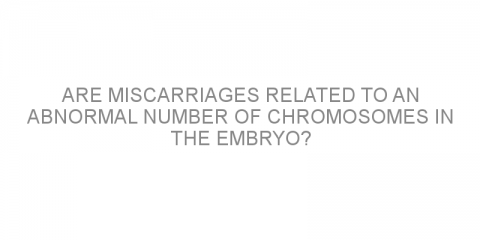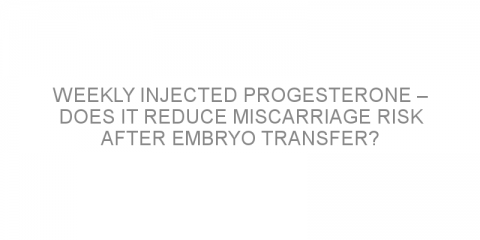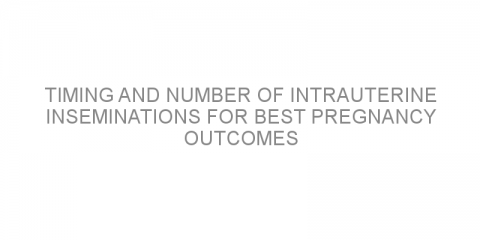In a nutshell This review looked at whether progesterone supplements reduce miscarriage in women who have bleeding during pregnancy. It found that oral progesterone pills reduced miscarriage in these women. Some background Miscarriage is a concern for women who are pregnant or trying to conceive. Bleeding, pain or cramping during early pregnancy is a...
Read MoreReason(s) for signing up-Multiple pregnancy losses (miscarriages) Posts on Medivizor
Are miscarriages related to an abnormal number of chromosomes in the embryo?
In a nutshell This study looked at whether couples who had repeated miscarriages or lack of implantation were more likely to have embryos with an unusual number of chromosomes (aneuploidy). It found that couples with repeated past miscarriages were more likely to have aneuploid embryos. Some background When eggs and sperm form, pairs of chromosomes...
Read MoreHyaluronic acid gel: is it effective in preventing intrauterine adhesions after miscarriage?
In a nutshell This study investigated if hyaluronic acid gels (HAGs) prevent intrauterine adhesions (IUAs) after a miscarriage (pregnancy loss). They found that HAGs reduce IUAs and improve pregnancy rates (PRs) in these women. Some background Intrauterine adhesions (IUAs) are common after a miscarriage. IUAs happen when a pregnancy is lost and...
Read MoreWhat parameters affect live birth outcomes after frozen blastocyst transfer?
In a nutshell This study investigated the factors affecting the live birth rate (LBR) after frozen blastocyst transfer (FBT). They found that a higher body mass index (BMI; a measure of weight in relation to height) and a high miscarriage rate (MCR) were associated with lower LBR after FBT. Some background Assisted reproduction (AR)...
Read MoreDo depression and stress affect patients’ chances of becoming pregnant after multiple miscarriages?
In a nutshell This study examined the rates of stress and depression among patients who have had multiple miscarriages. The authors found that depression and stress did not impact future chances of becoming pregnant and that a successful pregnancy reduced emotional distress. Some background Pregnancies that do not reach full term are called...
Read MoreWeekly injected progesterone – does it reduce miscarriage risk after embryo transfer?
In a nutshell This study investigated if weekly intramuscular progesterone (IM-PG) reduces miscarriage (MC) risk in women seeking assisted reproduction (AR). They found that weekly IM-PG may reduce the risk of MC in these women. Some background Progesterone (PG) is an important hormone in pregnancy. PG helps prepare the uterus for...
Read MoreSurgical treatment of hydrosalpinx: how does this impact fertility?
In a nutshell This study investigated the effects of surgical removal of a hydrosalpinx on female fertility. They found removal of a hydrosalpinx resulted in higher pregnancy rates compared to the alternative surgical approach, salpingectomy. Some background Female infertility can have a number of causes and one of these is tubal disease. Tubal...
Read MoreDoes male obesity affect fertility?
In a nutshell This study evaluated current evidence of the effects of male obesity on fertility. The study concluded that male obesity is associated with reduced fertility. Some background Male infertility is the inability to reproduce naturally. It is the cause of approximately 50% of infertility cases. Defective sperm function is the most common...
Read MoreCan weight loss improve your chances of conceiving and giving birth?
In a nutshell This study explored the idea that losing weight may improve the chances of conceiving and giving birth in overweight patients. Some background Roughly 50% of women of reproductive age are currently overweight, with a body mass index (BMI, a measure of body fat that takes height and weight into account) of more than 25...
Read MoreNegative outcomes associated with assisted conception techniques
In a nutshell This analysis examined the effects of different assisted reproductive techniques on birth outcomes. Some background For women and men with fertility issues, assisted conception techniques can be the only path to pregnancy. Techniques such as intrauterine insemination, or IUI (when semen is inserted directly into the uterus), in...
Read MoreImproving pregnancy outcomes in women with endometriosis: the role of GnRH analogs
In a nutshell This article reviewed current data regarding pregnancy outcomes in women with endometriosis treated with a gonadotropin-releasing hormone (GnRH) analog before in-vitro fertilization (IVF). Some background Endometriosis is a condition in which cells of the inner-most layer of the uterus can be found in other organs (most commonly the...
Read MoreTiming and number of intrauterine inseminations for best pregnancy outcomes
In a nutshell This study examined which intrauterine insemination (IUI) protocol yields the best pregnancy outcomes in women in which ovulation was induced using medications. Some background The first line of treatment in many infertile couples is the combination of ovulation induction drugs plus IUI. Induced ovulation involves giving medications,...
Read More









